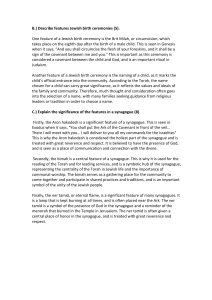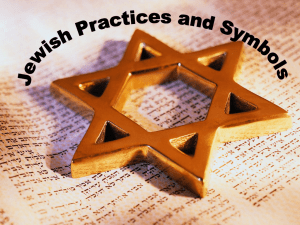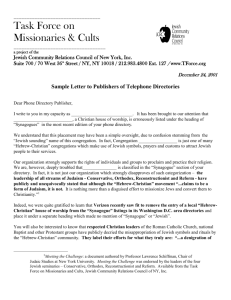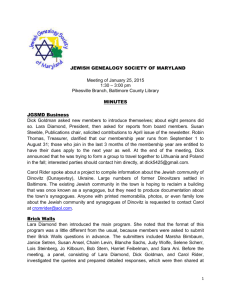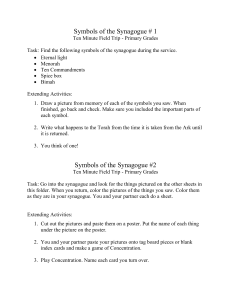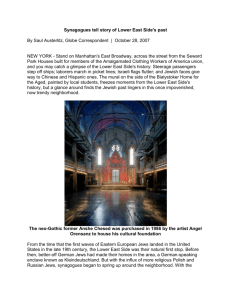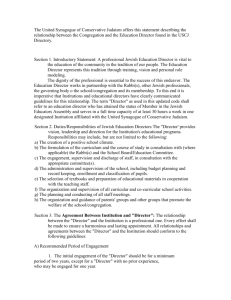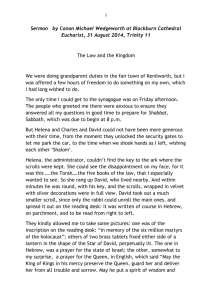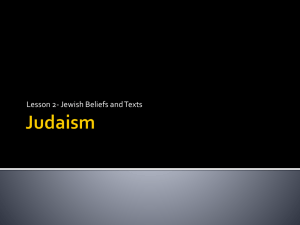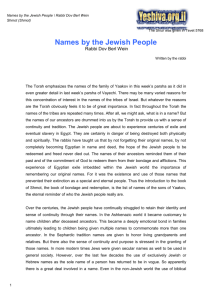A Place for Us - Rabbi Peg Kershenbaum
advertisement
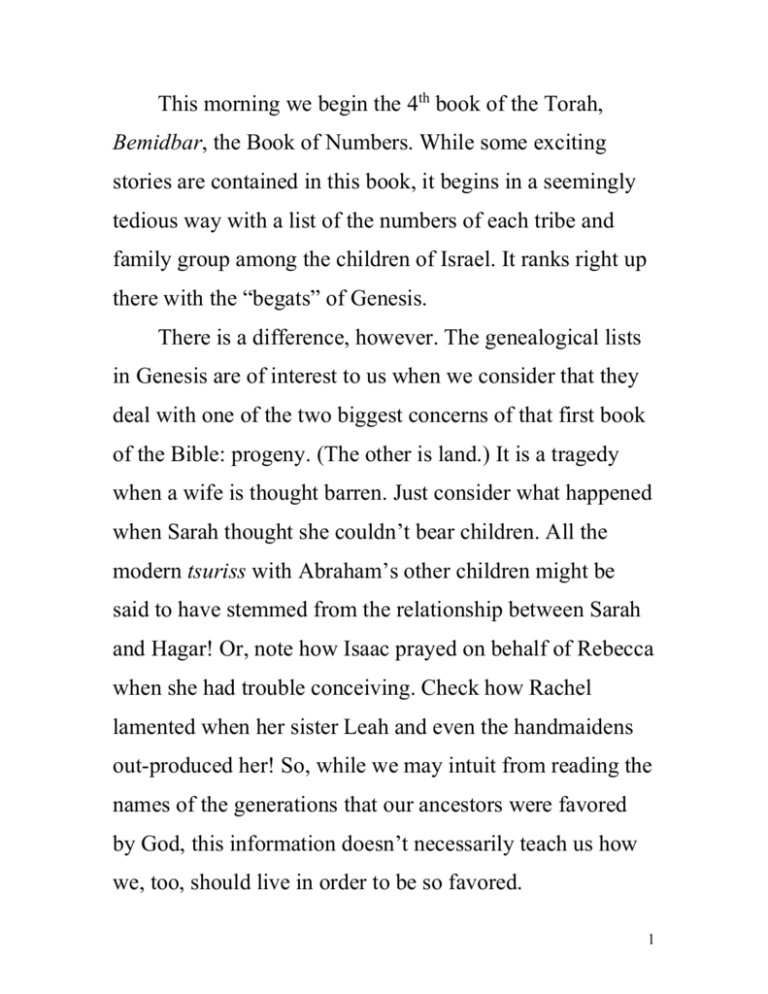
This morning we begin the 4th book of the Torah, Bemidbar, the Book of Numbers. While some exciting stories are contained in this book, it begins in a seemingly tedious way with a list of the numbers of each tribe and family group among the children of Israel. It ranks right up there with the “begats” of Genesis. There is a difference, however. The genealogical lists in Genesis are of interest to us when we consider that they deal with one of the two biggest concerns of that first book of the Bible: progeny. (The other is land.) It is a tragedy when a wife is thought barren. Just consider what happened when Sarah thought she couldn’t bear children. All the modern tsuriss with Abraham’s other children might be said to have stemmed from the relationship between Sarah and Hagar! Or, note how Isaac prayed on behalf of Rebecca when she had trouble conceiving. Check how Rachel lamented when her sister Leah and even the handmaidens out-produced her! So, while we may intuit from reading the names of the generations that our ancestors were favored by God, this information doesn’t necessarily teach us how we, too, should live in order to be so favored. 1 You might think that the census numbers of the tribes are about as compelling as those begats, especially when the information is presented twice within one Torah portion! The first time, in a section that Bev has read on other occasions, the names and numbers are set forth in a census for war. But this time, Bev wanted to explore a different passage in the same Torah portion. This time we read part of the deployment instructions that list where each tribe should encamp and how they should order themselves. Coupled with the beautiful words of the haftarah, this section carries an inspiring message. There were more than 600,000 men of fighting age accounted for in our parashah. That figure doesn’t take into account the Levites or women and children or non-Israelite members of households. Conservative estimates put the total of people following God and Moses at over 2 million. For now, don’t let the huge number bother you. The point is that each one of the congregation had a place where he or she belonged that was set in such a way as to allow the Mishkan, the place where God’s presence was situated amidst the camp, to be visible. The tribe of Levi, although 2 they were not counted for purposes of battle, had individual tasks pertaining to the sacred tent and its objects, especially when the people were on the march. What were the responsibilities of the rest of the tribes? To surround the Mishkan as they had once surrounded Sinai. To keep God at the center and to carry out the laws they had all accepted during the great Revelation. Back in the late forties and fifties, after WW2 in this country there was a period of tremendous growth in Jewish communities, especially in the suburbs as people moved out of cities to settle in places that afforded them a share in the American Dream. I think many of us remember the types of synagogues and Jewish centers that grew up at that time. Where country clubs might still resist Jewish membership, the synagogues provided acceptance, a place for elegant social and charitable events, a track to run on and often, a pool to swim in! The youth group movements burgeoned and offered wonderful opportunities for Jewish teens to mix with other Jewish teens before going off to college and into the workforce. The synagogue was truly at 3 the center of Jewish enclaves in suburbia and even in some rather urban areas. Slowly, as we became more accepted, more mobile, more assimilated into the larger American culture, and as values seemed to change, people began to turn from the huge synagogues that had served their parents or themselves as children. Other interests competed with what seemed the provincialism of the synagogue. Other social venues were more attractive. Other friends outside “the tribe” claimed some of our time. Sometimes those who remained active in synagogue life became exasperated or worse with those less committed, with those for whom the synagogue was not at the center. According to the lore of B’nai Harim, the vision of its founders was to create a synagogue where no one was judged on the basis of wealth, no one was overlooked when walking in for the first time, no one was made to feel unwelcome or not loyal enough. Too many of the founders had left synagogues feeling snubbed and unappreciated and they would not be part of such an institution again. I’m sure many of you, whether of the first generation of members or 4 not, have either experienced this type of treatment or heard about it. One of the intentions of the leadership of B’nai Harim has been to offer each member a sense of place and a sense of purpose. This is exactly what is suggested by our Torah portion. The Israelites lived fairly harmoniously despite the huge numbers. Even Balaam, the foreign prophet called in to curse the people had to exclaim at the excellence of their community. As long as they took their places with an eye toward the center of their being—their spiritual power— their tents and dwelling places were “goodly”, as we sing in the Ma Tovu each Shabbat. But, many times we lose sight of our spiritual center and the values that preserve our integrity. Each year we reflect and regret the loss of connection with the sense of the divine within us and within the world, determined to renew the bonds that hold us together. But something has to respond to our yearning. We need to feel the presence of God in our lives today. We need to know our purpose. In the haftarah that Bev chanted for us, God starts out exasperated with the Jewish people. We have been disloyal, 5 we’ve assimilated, we’ve been ungrateful. In one breath, God condemns the relationship we’ve had, threatening to disown, embarrass and abandon the very people God had treated with such special favor. But in the next breath, God remembers the loving relationship of the past, a time when the eyes of Israel were on God and God responded generously. God sings tenderly: V’eiristich li l’olam “I will espouse you forever: I will espouse you with righteousness and justice and with goodness and mercy, and I will espouse you with faithfulness. Then you shall be devoted to the Lord. In that day, I will respond, declares the Lord.” We have a place in God’s esteem as our ancestors had a place in the wilderness. There is orderliness. There is a centrality of spiritual concerns. There is a part to play. There is a connection with what is lasting, good, faithful and loving If we will accept it as our gift from God and let it always be manifest it in our community. 6
